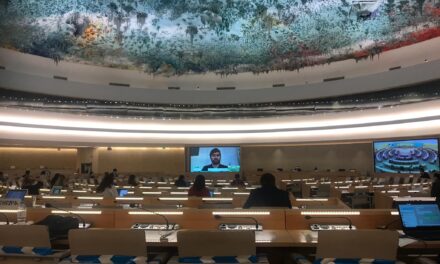By Walden Bello*
(Adapted from the author’s speeches during an anti-war tour of Italy, Feb. 22-27, 2005)
Europe and the world have witnessed over the last few days the unfolding of a diplomatic offensive that is designed to convince Europeans, “to put Iraq behind them.” The effort is, in fact, geared to persuade not only Europeans but also the world that with the recent elections in Iraq, there is a new game that must be played, and the name of that game is democracy.
The reality is that the old game of domination and occupation continues, and the US is not winning. The triumphalism that accompanied George W. Bush’s tour of “Old Europe,” with his brand new Secretary of State, Condoleeza Rice, at his side, was a public relations effort to counter the reality of the spread of a wide and deep resistance in Iraq. There is not only the military resistance that we witness day-to-day on television. There is also a political resistance that is broader than the military resistance. There is, as well, massive civil resistance-which encompasses not only trade union opposition but all those acts ordinary citizens engage in day-to-day to deny legitimacy to the occupation that James C. Scott calls the “weapons of the weak.”
The US: Losing in Iraq
The truth is that the US is losing the war in Iraq, both politically and militarily. The number of governments in the so-called “Coalition of the Willing” is now so reduced that the Pentagon has dropped the term and started using “multinational forces” instead. The 135,000 US troops are stretched thin, their numbers unable to stop the wildfire rise of a guerrilla insurgency. Estimates of many military experts of the minimum necessary number to fight the guerrillas to a stalemate range from 200,000 to a million. It is impossible to attain these numbers without provoking massive civil unrest in the US, where the majority of the population now sees the military intervention as unjustified. Mr. Bush may have won the elections but it was not because of public support for the war, and he knows this.
In the US military itself, more and more troops, even in active duty, along with their families, are speaking out against the war. A few weeks ago, television audiences worldwide witnessed an assembly of troops applauding criticism of Defense Secretary Rumsfeld by an officer who accused him of sending the troops to war without sufficient protection. We have also witnessed an American unit that refused to deliver supplies to a city several miles away because they said their vehicles were unsafe. There are probably more and more such incidents if journalists bothered to look instead of “embedding” themselves with the Pentagon.
The US Army, one must recall, fell apart internally at the last stages of the Vietnam War owing to demoralization, which took the form of, among other things, the “fragging” of officers, or throwing grenades at them. With about 40 per cent of the Army troops in Iraq being non-regular forces with the National Guard, who are not fulltime soldiers, the steady erosion of morale among US units must not be underestimated. Probably the only soldiers that can resist demoralization are the stupidly gung-ho Marines, but they are a minority in what is otherwise an Army show.
The Crisis of Overextension
But the US is not only overextended in Iraq. Iraq has in fact worsened the crisis of overextension of the US globally. The key manifestations of the imperial dilemma stand out starkly:
Despite the recent US-sponsored elections in Afghanistan, the Karzai government effectively controls only parts of Kabul and two or three other cities. As UN Secretary General Kofi Annan has said, despite the elections, “without functional state institutions able to serve the basic needs of the population throughout the country, the authority and legitimacy of the new government will be short-lived.” And so long as this is the case, Afghanistan will tie down 13,500 US troops within the country and 35,000 support personnel outside.
The US war on terror has backfired completely, with Al Qaeda and its allies much stronger today than in 2001. The invasion of Iraq, according to Richard Clarke, Bush’s former anti-terrorism czar, claims, derailed the war on terror and served as the best recruiting device for Al Qaeda. But even without Iraq, Washington’s heavy handed police and military methods of dealing with terrorism were already alienating millions of Muslims. Nothing illustrates this more than Southern Thailand, where US anti-terrorist advice has helped convert simmering discontent into a full-blown insurgency. – With its full embrace of Ariel Sharon’s no-win strategy of sabotaging the emergence of a Palestinian state, Washington has forfeited all the political capital that it had gained among Arabs by brokering the now defunct Oslo Accord. Moreover, the go-with-Sharon strategy, along with the occupation of Iraq, has left Washington’s allies among the Arab elites exposed, discredited, and vulnerable. With the death of Yasser Arafat, Tel Aviv and Washington may entertain hopes of a settlement of the Palestinian issue on their terms. This is an illusion, and we probably will see this in growing support for Hamas among the Palestinians at the expense of Mr. Abbas’ PLO.
Latin America’s move to the left will accelerate. The victory of the leftist coalition in Uruguay is simply the latest in a series of electoral victories for progressive forces, following those in Venezuela, Ecuador, Argentina, and Brazil. Along with electoral turns to the left, there may also be in the offing more mass insurrections such as that which occurred in Bolivia in October 2003. Speaking of the turn towards the left and away from the empire, one of the US’ friends, former Mexican Foreign Minister Jorge Castaneda, assesses the situation accurately: “America’s friends.are feeling the fire of this anti-American wrath. They are finding themselves forced to shift their own rhetoric and attitude in order to dampen their defense of policies viewed as pro-American or US-inspired, and to stiffen their resistance to Washington’s demands and desires.”
This is the global picture that belies the triumphalism that accompanied Bush’s European tour. This enterprise sought to enlist diplomacy in the service of countering the erosion of the American position. It was a trip undertaken out of desperation. One can, in fact, say that while the papers have been filled with bellicose words from Washington against Iran, Syria, and North Korea, the reality is that, owing to its being pinned down in an endless war in Iraq, the US is in less of a position to destabilize these governments than it was in 2003, before the invasion of Iraq.
What we are witnessing is the third major PR effort to convince the world that Iraq has been pacified. The first was the famous declaration of victory on board the aircraft carrier Abraham Lincoln in May 2003. We all know what happened afterwards. The second was the transfer of sovereignty to the Iraqi people last June. A sharp escalation of the resistance followed that forgettable episode. Now, this effort to convince the world, relying on television images, that elections carried out under military occupation and amidst widespread resistance–which were boycotted by millions of Iraqi voters-were an exercise in “freedom” and “democracy.”
Wooing the Venusians
Europe is, of course, the special target of the Bush strategy. The shift in the assessment of Europe’s position brought about by the hard realities of the Iraq resistance is illustrated by the neoconservative ideologue Robert Kagan. In 2002, Kagan spoke disparagingly of Europe’s approach to world order, with his notorious comment that “Americans are from Mars and Europeans are from Venus.” In 2004, the same Kagan had changed his tune somewhat, writing in Foreign Affairs that “Americans will need the legitimacy that Europe can provide, but Europeans may well fail to grant it.”
Fortunately, Europeans are not being taken in by the “new,” “conciliatory” Bush. The liberal Financial Times regards the new approach as constituting a “belated recognition that the US is overstretched and is in need of allies,” though it cautions Europeans against adopting a “do-nothing attitude” towards the Bush initiative. Yet, unfortunately for the Times, on the question of Iraq, there is really little the Western European governments can do since their peoples continue to be strongly against participation in the US war by large majorities. Indeed, even in less anti-American Eastern Europe, the US is losing allies, with Hungary formally leaving the coalition and the Polish government stating its wish to pull out the Polish contingent as soon as “circumstances allow.”
Bush’s diplomacy is, in fact, running against the long term currents. The Atlantic Alliance is dead. Iraq was merely the coup de grace to a relationship that had been savaged by escalating conflicts with the US on trade, environmental, and security issues. Indeed, not only is the basis of common action disappearing but, as American expert Ivo Daalder contends, “not a few [Europeans] now fear the United States more than what, objectively, constitute the principal threat to their security.” Already, European experts such as Marco Piccioni are arguing to a receptive public that the US presence in Iraq is part of a larger Middle East strategy designed to exclude Europe from oil producing areas by force if necessary.
If France and Germany went the distance in refusing to legitimize the American invasion of Iraq and, at this point, pointedly refuse to make any commitments, it is not simply because of the anti-war sentiments of their citizens. It is also to discourage any future US moves that might pose a direct threat to their own national security. European civil society was largely a spectator during the Bush tour. Despite the deep rift between their governments and Washington, citizens’ movements in Europe cannot let down their guard. Indeed, European disengagement from the Iraq War is incomplete. Despite large majorities in their populations opposing participation in the war, the Blair and Berlusconi governments continue to maintain military units in Iraq. Knocking Britain and Italy out of the war against the people of Iraq is the top priority in the agenda of the European anti-war movement in the next few months.
*Executive Director of the Bangkok-based Focus on the Global South and professor of sodciology and public administration at the University of the Philippines, Walden Bello has just completed a one-week speaking tour of Italy coinciding with the Bush visit to Europe.









